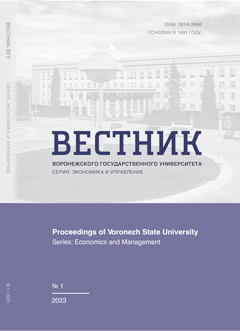Промежуточные итоги цифровизации системы здравоохранения: направления развития и основные угрозы
Аннотация
Предмет. Углубленный анализ результатов ранних стадий цифровизации медицины (Health 4.0) показал, что для обеспечения приемлемых (в перспективе равных) условий всех участников рынка медицинских услуг необходима разработка эффективного механизма безопасного функционирования, позволяющего осуществлять конструктивное взаимодействие участников рынка в процессе цифровизации сферы здравоохранения.
Цель. Определение направлений цифровизации здравоохранения, способствующих устранению барьеров внедрения цифровых коммуникаций, снижающих эффективность взаимодействия участников на рынке медицинских услуг, с учетом проблем, потенциальных возможностей и угроз, выявленных на ее ранних стадиях цифровизации.
Методы. Методологическую основу исследования составляют общенаучные методы, которые позволяют представить комплексную картину трансформации отечественной системы здравоохранения в условиях цифровизации. В работе исследуются итоги цифровизации системы здравоохранения за 2017-2021 гг. Особое внимание уделено таким ее аспектам как удовлетворение потребности населения страны в качественной медицинской помощи и оптимизация деятельности медицинских учреждений.
Результаты. В числе основных негативных результатов цифровизации отечественной системы здравоохранения рассматриваются увеличение обращений за платной медицинской помощью и доминирование технического аспекта коммуникационной составляющей ИКТ над социальным, что уже проявляется в росте поляризации защищенности (безопасности) поставщиков и потребителей медицинских услуг, а в перспективе – в затруднении доступа к получению качественной медицинской помощи. Для устранения угроз, выявленных на ранних стадиях цифровизации отрасли, авторы обращают внимание на формирование социальной среды, благоприятной для ведения здорового образа жизни (на базе современных технологий управления общественными отношениями); приоритет лечебной деятельности на основе возможностей цифровизации; профилактика.
Выводы. Авторы отмечают, что усиление тенденций поляризации интересов, преимуществ и степени защищенности участников рынка медицинских услуг могут привести к развитию негативных аспектов в реализации социально-экономических и политических процессов. Необходима разработка и внедрение особого механизма, обеспечивающего баланс интересов участников взаимодействия, за счет сокращения наметившейся поляризации и создание равных условий защиты потребителей и производителей медицинских услуг. В противном случае снижение доступности качественной медицинской помощи, соответствующей платежеспособному спросу основной массы потребителей, может привести к снижению качества человеческого капитала.
Литература
Aksenova, E. I. & Gorbatov, S. Yu. (2020) [Expert review: Digitalization of healthcare experience and examples of transformation in the healthcare system in the world]. Moscow: SBI «Research Institute for Healthcare Organization and Medical Management of Moscow Healthcare Department» publ.
Beltyukova, S. M., Mokrushin, V. & Samoilov, P. (2019) The digital economy and its role in the management of modern socio-economic relations.
Ershova, N. A. (2019) Digital economy and its role in management of modern social and economic relations. State and municipal management. Scholar notes. 4, 102–105. (In Russian)
Karpov, O. E. et al. (2017) Digital public health necesity and background. Medical doctor and it. 3, 6–22. (In Russian)
Karpov, O. E. et al. (2016) [Digital health in digital societies.] Moscow: Business Express publ. 491p. (In Russian)
Nedosekin, S. V. & Guzhina, G. N. (2019) [Digitalization of the economy and its role in the management of modern socio-economic relations In: Collection of works "Russian entrepreneurship: from manufacturing to the digital economy and cluster structures."] Orekhovo-Zuyevo, 27–28 September, 2019. State University of Humanities and Technology, pp. 57–64. (In Russian)
Panova, T. V. (2017) Information technologies in Russian medicine: prospects and opportunities. Economic Sciences. 5, 53. (In Russian)
Semina, T. A. (2017) [Implementation of the project "Lean polyclinic in the Tula region" in the public health institutions of the Tula region providing medical and sanitary care to the adult population on an outpatient basis.] Tula, TulGU, publ. 35p. (In Russian)
Semjachkov, K. A. (2017) Digital economy and its role in the management of modern socio-economic relations. Modern management Technology. 8(80), 1. (In Russian)
Stefanova, N. A. & Andronova, I. V. (2018) Problems of digitalization of healthcare spere: Russian and foreign expirience. Vestnik of Samara uiversity. Economics and management. 3(9), 31–35. (In Russian)
Stefanova, N. A. & Mursalimov, D. A. (2018) Digital economy and its role in the management of modern socio-economic relations. Actual Issues of the Modern Economics. 3, 44–47. (In Russian)
Stefanova, N. A. & Rachmanova, T. E. (2018) Application of chatbot technology in modern medicine. Actual Issues of the Modern Economics. 8, 256—258. (In Russian)
Sukhova, V. A. (2018) [Digital economy: opportunities for countries and ways to regulate it.] Young scientist. 21, 303–306. (In Russian)
Tarasov, I. V. (2018) Industry 4.0: concept & development. Business Strategies. 6(50), 57–63. (In Russian)
Khromushin, V. A. et al. (2016) Evaluation of age cohorts of the population mortality on the example of Tula Region for the period 2007 to 2015. Journal of new midicial technologies, eedition. 3, 11–16. DOI: 10.12737/21280 (In Russian)
Sharipova, G. R. (2018) Digital economy and its role in the management of modern socio-economic relations. Actual issues of the modern economy. 8, 181–186. (In Russian)
Yusupova, M. G., Gordina, M. G., & Alieva, V. I. (2019) Digital economy and its role in management modern economic relations. Moscow economic journal. 12, 371–379. DOI: 10.24411/2413-046Х-2019-10253
Ahmed, S. M. & Rajput, A. (2020) Threats to patients’ privacy in smart healthcare environment. In: Innovation in Health Informatics. Academic Press. pp. 375–393. DOI: 10.1016/B978-0-12-819043-2.00016-2
Al-Jaroodi, J., Mohamed, N. & Abukhousa, E. (2020) Health 4.0: On the Way to Realizing the Healthcare of the Future. IEEE Access. 8, 211189-211210. DOI: 10.1109/ACCESS.2020.3038858
Ciasullo, M. V. et al. (2022) Putting Health 4.0 at the service of Society 5.0: Exploratory insights from a pilot study. Socio-Economic Planning Sciences. 80, 101163. DOI: 10.1016/j.seps.2021.101163
Liu, Z. et al. (2022) Virtual Reality Aided Therapy towards Health 4.0: A Two-Decade Bibliometric Analysis. International Journal of Environmental Research and Public Health. 19. DOI: 10.3390/ijerph19031525
Mishon E. V. (2020) Analysis and Forecasting of Prospects for Digitalizftion of a Regional Healthcare System. Lecture Notes in Networks and Systems. 87, 548–554. DOI: 10.1007/978-3-30-29586-8_63
Mishon, E. V., Sokolov, A. A. & Breslavtseva, N. A. (2020) Analysis of Healthcare Dijitalization Trends and Tools for Their Implementation. Lecture Notes in Networks and Systems. 87, 541–547. DOI: 10.1007/978-3-30-29586-8_62
Polynskaya, G. A. & Mesropyan, M. G. (2018) Detection of patterns and trends in patient behavior while using electronic applications and Internet resources for self-diagnosis. Business Informatics. 1(43), 28–38. DOI: 10.17323/1998-0663.2018.1.28.38.

Это произведение доступно по лицензии Creative Commons «Attribution» («Атрибуция») 4.0 Всемирная.























